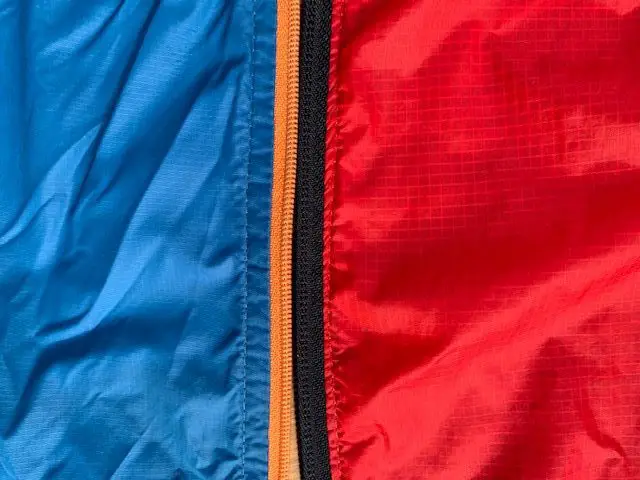Hammocks have been around for centuries, but their popularity as a camping accessory has surged in recent years.
They offer a comfortable and lightweight alternative to traditional tents, allowing you to sleep suspended above the ground.
Many campers and backpackers appreciate the convenience of hammocks, as they are easy to set up, pack down, and transport. But when it comes to choosing between nylon and polyester hammocks, it can be challenging to know which one is right for you.
Nylon is a synthetic material that is known for its strength and durability. It is often used to make products like parachutes, ropes, and camping gear. Nylon hammocks are lightweight and compact, making them perfect for backpacking and long-distance hiking.
Polyester is another synthetic material and is popular for its versatility and low cost. It is commonly used in clothing, home furnishings, and outdoor gear. Polyester hammocks are known for their durability and resistance to weather, making them suitable for extended periods of outdoor use.
Best Hammock Material for The Outdoors?
When it comes to choosing the best material for an outdoor hammock, nylon and polyester are the two leading contenders. Both materials offer unique benefits, but deciding which one is right for you depends on a variety of factors including durability, comfort, weather resistance, and personal preference. Let’s dive into the nitty-gritty details of each material to help you make an informed decision.

Nylon: The Soft, light and Stretchy Option
Pros:
- Comfort and Softness: One of the biggest advantages of nylon is its comfort. Nylon fibers are softer and more flexible than polyester, providing a silky-smooth feel against your skin. This makes nylon hammocks a cozy choice for lounging and napping.
- Lightweight and Packable: If you’re an avid backpacker or camper who values lightweight gear, nylon hammocks are your friend. They are incredibly light and compressible, making them easy to pack and carry.
- Strength and Flexibility: Nylon is a strong material that can support significant weight while maintaining a bit of stretch. This flexibility can add to the comfort level, as the hammock molds to your body shape.
Cons:
- UV Sensitivity: Nylon is more susceptible to damage from prolonged exposure to UV rays. Over time, excessive sun exposure can weaken the fibers, causing the hammock to degrade.
- Absorbs Water: Nylon tends to absorb water more readily than polyester. While it dries fairly quickly, a wet nylon hammock can be less comfortable and might take longer to dry out after a rainstorm.
Polyester: The Durable and Weather-Resistant Choice
Pros:
- UV Resistance: Polyester is highly resistant to UV rays, making it a more durable choice for long-term outdoor use. If your hammock is going to be exposed to a lot of direct sunlight, polyester is the way to go.
- Water Resistance: Polyester doesn’t absorb water like nylon does. It’s more water-resistant, which means it won’t soak up moisture from rain or dew as easily. This property also helps it dry faster, keeping you comfortable and reducing the risk of mildew.
- Less Stretch: Polyester is more rigid and doesn’t stretch as much as nylon. For some, this translates to a more stable and supportive hammock experience, especially if you prefer a firmer feel.
Cons:
- Less Comfort: The flip side of polyester’s durability is that it’s generally not as soft or stretchy as nylon. Some people might find polyester hammocks less comfortable, especially for extended lounging.
- Heavier: Polyester is typically a bit heavier and bulkier than nylon, which might be a consideration if you’re trying to minimize the weight of your gear.
Choosing the Best Material for Your Needs
When deciding between nylon and polyester, consider how and where you’ll be using your hammock.
- For Backpacking and Lightweight Travel: If you’re hitting the trails and need a hammock that won’t weigh you down, nylon is the superior choice. Its lightweight nature and packability make it ideal for hikers and backpackers who prioritize comfort without sacrificing portability.
- For Long-Term Outdoor Use: If your hammock will have a permanent spot in your backyard or be subjected to continuous outdoor exposure, polyester’s UV resistance and durability give it an edge. You won’t have to worry about the material breaking down as quickly in the sun, and it will handle wet weather better.
- For All-Weather Versatility: If you live in a region with unpredictable weather, polyester’s quick-drying properties and resistance to mildew make it a safer bet. While nylon can handle a variety of conditions, polyester excels in staying dry and maintaining its integrity.
- For Comfort and Lounging: If ultimate comfort is your priority and you don’t mind a bit more maintenance to protect it from the elements, a nylon hammock’s softness and slight stretch can’t be beaten. It’s perfect for those lazy afternoons where you just want to sink in and relax.
In the end, both nylon and polyester offer excellent options for outdoor hammocks, each with its own set of strengths. If you need a lightweight, ultra-comfortable hammock for backpacking trips, nylon is your go-to. For a more durable, weather-resistant option that can withstand the elements for long-term outdoor use, polyester is the better choice.
Think about how you’ll use your hammock, the climate you’ll be in, and your personal comfort preferences. By weighing these factors, you’ll be well on your way to choosing the perfect hammock material for your outdoor adventures. Happy hammocking!
Key Differences: Nylon vs. Polyester Hammocks
There are several key differences between nylon and polyester hammocks that you should consider before making your decision:
Weight and Portability
Nylon hammocks are generally lighter and more compact than polyester hammocks. This makes them the preferred choice for backpackers and long-distance hikers who need to minimize the weight of their gear.
Polyester hammocks, while still relatively lightweight, may be slightly bulkier and heavier than their nylon counterparts.
Durability and Strength
When it comes to durability and strength, both nylon and polyester hammocks have their advantages.
Nylon hammocks are known for their exceptional strength and can support significant amounts of weight without tearing or stretching.However, they may be more susceptible to abrasion and can degrade over time when exposed to UV radiation.
Polyester hammocks, on the other hand, are more resistant to UV radiation and are less prone to abrasion.
This makes them a better choice for extended periods of outdoor use or for those who plan to leave their hammock set up for long periods of time.
Weather Resistance
Both nylon and polyester hammocks offer some degree of weather resistance, but there are subtle differences between the two materials.
Nylon is more water-resistant than polyester, which means it will dry faster after getting wet. This can be an important factor if you’re camping in an area with frequent rain or damp conditions.
Polyester hammocks, however, are more resistant to UV radiation, which means they will last longer when exposed to sunlight.If you plan to use your hammock in direct sunlight for extended periods of time, polyester may be the better choice.
Comfort and Stretch
The comfort of a hammock is largely subjective and varies from person to person. Some people prefer the slight stretchiness of nylon hammocks, which can provide a more “cocoon-like” feel when lying in them.
Nylon hammocks often have a softer and more comfortable texture compared to polyester hammocks.
Polyester hammocks, on the other hand, are less stretchy and may feel more stable and supportive.Some people prefer this feeling, as it can make it easier to find a comfortable sleeping position.
Price
In general,nylon hammocks tend to be more expensive than polyester hammocksdue to their higher strength and lighter weight.
However, the price difference is not always significant, and there are plenty of affordable nylon and polyester hammocks available on the market.
Which Hammock is Best for Different Camping Scenarios?
Your choice of hammock material will depend on the specific requirements of your camping trip. Here are some scenarios where one material may be more suitable than the other:
Backpacking and Long-Distance Hiking
For backpacking and long-distance hiking, a nylon hammock is likely the better choice.The lighter weight and smaller packed size make it easier to carry in your backpack, and the superior strength ensures you can trust it to hold up even after many nights of use.
Car Camping and Short Hikes
For car camping or short hikes where weight and packed size are not as critical, a polyester hammock may be more suitable.
The increased durability and UV resistance make it an excellent option for extended periods of outdoor use, and the lower price point makes it a more budget-friendly choice.
Camping in Damp or Wet Conditions
If you’re camping in damp or wet conditions, a nylon hammock is likely the better choice.The water-resistant properties of nylon mean that it will dry faster after getting wet, making it more comfortable to sleep in at night.

Camping in Sunny or Hot Climates
For camping in sunny or hot climates, a polyester hammock may be more suitable.The increased UV resistance of polyester means that it will hold up better under direct sunlight, ensuring it lasts longer over time.
Taking Care of Your Hammock
Regardless of the material you choose, proper care and maintenance are essential to ensure the longevity of your hammock. Here are some tips for taking care of both nylon and polyester hammocks:
- Always follow the manufacturer’s instructions for cleaning and care.
- After each use, inspect your hammock for any signs of damage or wear to ensure it remains safe and functional.
- Allow your hammock to dry completely before storing it to prevent the growth of mold and mildew.
- Store your hammock in a cool, dry place away from direct sunlight.
Conclusion: Which Hammock Material is Best for Camping?
In conclusion, the best hammock material for camping depends on your personal preferences and the specific requirements of your trip.
Nylon hammocks are generally lighter, more compact, and have a higher strength-to-weight ratio, making them ideal for backpacking and long-distance hiking.
Polyester hammocks, on the other hand, are more durable, UV-resistant, and less prone to abrasion, making them a better choice for extended periods of outdoor use.
Here are 10 facts to consider when choosing between a nylon and polyester hammock for camping:
1.Nylon hammocks are lighter and more compact than polyester hammocks.
2.Polyester hammocks are more resistant to UV radiationand abrasion.
3.Nylon hammocks are more water-resistantand dry faster than polyester hammocks.
4.Polyester hammocks are generally less expensivethan nylon hammocks.
5.Nylon hammocks are known for their exceptional strengthand can support significant amounts of weight.
6.Polyester hammocks may feel more stable and supportivedue to their lack of stretch.
7.Nylon hammocks are generally more comfortablewith a softer texture.
8.Polyester hammocks are more suitable for extended periods of outdoor usedue to their increased durability and UV resistance.
9.Nylon hammocks are the preferred choice for backpacking and long-distance hikingdue to their lighter weight and smaller packed size.
10.Proper care and maintenance are crucialfor ensuring the longevity of both nylon and polyester hammocks.
FAQs
Are nylon hammocks good?
Yes, nylon hammocks are good as they are lightweight, durable, and quick-drying, making them perfect for outdoor activities such as camping, hiking, and backpacking. They are also comfortable and easy to clean, making them a popular choice for many hammock enthusiasts.
What type of hammock is most comfortable?
The most comfortable type of hammock is a Brazilian hammock, which is made of cotton and has a tight weave that conforms to the shape of the body.
What is the best fabric for hammock?
The best fabric for a hammock is typically a durable and breathable material such as cotton or nylon. Cotton is soft and comfortable, while nylon is lightweight and resistant to weather and wear. Ultimately, the choice of fabric will depend on personal preference and the intended use of the hammock.
Is polyester good for hammocks?
Polyester is a durable and strong material that can be used for hammocks. It is resistant to water, mildew, and UV rays, making it a good choice for outdoor use. However, it may not be as comfortable or breathable as natural materials like cotton or hemp.
What is the most comfortable material for a hammock?
The most comfortable material for a hammock is typically cotton, as it is soft, breathable, and conforms to the body’s shape.
What’s the best kind of hammock?
The best kind of hammock depends on personal preference and intended use. However, a high-quality hammock made from durable materials, such as cotton or nylon, with sturdy suspension points and comfortable design is generally recommended.




